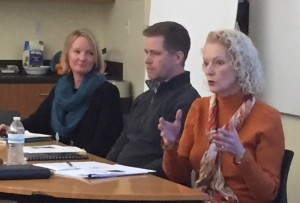Report: Lake Tahoe’s economy sputtering
By Kathryn Reed
Lake Tahoe’s economy is not thriving.
That was the message delivered this week by three members of the Tahoe Prosperity Center.
“We need to make it a less difficult place to make a living,” Heidi Hill Drum, executive director of TPC, told a group of near two dozen people at Lake Tahoe Community College on Dec. 16. She was joined on the panel by board members Jesse Walker and B Gorman. It was Gorman who spearheaded the TPC in 2011 as a way to have a single entity delving into the regional economic issues.
Earlier this fall the center released a report titled Measuring for Prosperity.

B Gorman, right, makes a point about Tahoe’s economy as Heidi Hill Drum and Jesse Walker listen. Photo/LTN
Highlights include:
· The Lake Tahoe Basin had a $4.7 billion economy in 2010, with tourism being responsible for two-thirds of that total.
· Tourism-related jobs went from 50 percent of the overall work force in 2003 to 44 percent in 2013. This could in large part be a result in the dramatic decline in casino jobs.
· 2013 was the first time population in the basin increased in years. It’s too soon to know if this is a blip or a trend.
· Hotel tax revenue is increasing in the basin, but not at the same pace as it is throughout California. With Monterey, Napa and Sonoma being Tahoe’s competitors, this is a concern that people in Northern California are choosing to vacation places other than Tahoe. However, with the tax rate being different in each locale, it’s not a true apples to apples comparison.
· There has been a significant loss in the 25-44 age group.
· Housing costs continue to outpace income levels.
· Unemployment is above average compared to California and Nevada.
“Generally household incomes are low in the basin and they are continuing to decline,” Walker said. “They are not keeping up with inflation.”
A chart showed North Lake Tahoe incomes the highest in the basin – averaging more than $35,000 a year, while in South Lake Tahoe they are below $25,000.
“We’ve got problems that are exacerbated by the income trend going down and housing going up,” Walker said.
Carl Ribaudo with Strategy Marketing Group said it’s time to look at unconventional, smaller housing options such as cargo containers or two houses on one lot.
TPC’s next project in partnership with chambers of commerce on both ends of the lake is going to be looking at the work force. Gorman said having enough workers to fill jobs is going to be a critical issue in the coming decade. She mentioned how businesses in the area are already having a hard time finding qualified candidates for jobs that aren’t entry level, service industry positions.